Military Resistance 8D16
NOT ANOTHER DAY
NOT ANOTHER DOLLAR
NOT ANOTHER LIFE
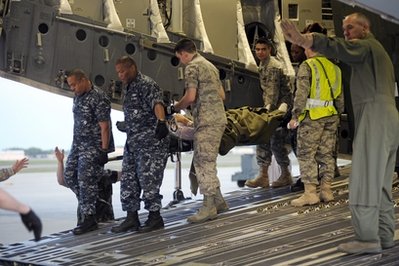
A wounded U.S. soldier is carried off of a
C-17 transport airplane to an ambulance at Andrews Air Force Base, Md., April
20, 2010. (AP Photo/Cliff Owen)
Used Up And Thrown Away
“Warehouses Of Despair, Where Damaged Men
And Women Are Kept Out Of Sight, Fed A Diet Of Powerful Prescription Pills And
Treated Harshly By Noncommissioned Officers”
“All They Do Is Make Things Worse”
“Many Soldiers At Fort Carson Complained
That Discipline And Insensitive Treatment By Cadre Members Made Wounded
Soldiers Feel As If They Were Viewed As Fakers Or Weaklings”
One Army Specialist “Said He Was Ordered To
Perform 24-Hour Guard Duty Repeatedly Against The Orders Of His Doctor”
[Here it is again. Same old story. Used up, thrown away, and the politicians
couldn’t care less. To repeat for
the 3,543rd time, there is no enemy in Iraq or Afghanistan. Their citizens and U.S. troops have a common
enemy. That common enemy owns and
operates the Imperial government in Washington DC for their own profit. That common enemy started these wars of
conquest on a platform of lies, because they couldn’t tell the truth:
U.S. Imperial wars are about making money for them, and nothing else. Payback is overdue. T]
[Thanks to SSG N (ret’d), Phil G & Clancy Sigal, who sent
this in.]
April 24, 2010 By JAMES DAO and DAN FROSCH,
The New York Times [Excerpts]
Christina
Perez, the wife of a transition unit soldier from Fort Carson, said she got
into an ugly fight with a member of the cadre who was furious that she had gone
over his head to request additional therapy for her husband, a sergeant first
class who had sustained a brain injury during one of two tours in Iraq as a
tank gunner.
In a
meeting, the noncommissioned officer shouted that Ms. Perez’s husband did
not deserve his uniform and that he should give it to her instead, Ms. Perez
said in a police complaint
April 24, 2010 By JAMES DAO and DAN FROSCH,
The New York Times [Excerpts]
COLORADO SPRINGS — A year ago,
Specialist Michael Crawford wanted nothing more than to get into Fort
Carson’s Warrior Transition Battalion, a special unit created to provide
closely managed care for soldiers with physical wounds and severe psychological
trauma.
A strapping Army sniper who once brimmed with
confidence, he had returned emotionally broken from Iraq, where he suffered two
concussions from roadside bombs and watched several platoon mates burn to
death. The transition unit at Fort
Carson, outside Colorado Springs, seemed the surest way to keep suicidal
thoughts at bay, his mother thought.
It did not work.
He was prescribed a laundry list of
medications for anxiety, nightmares, depression and headaches that made him
feel listless and disoriented.
His once-a-week session with a nurse case
manager seemed grossly inadequate to him. And noncommissioned officers —
soldiers supervising the unit — harangued or disciplined him when he
arrived late to formation or violated rules.
Last August, Specialist Crawford attempted
suicide with a bottle of whiskey and an overdose of painkillers. By the end of
last year, he was begging to get out of the unit.
“It is just a dark place,” said the
soldier, who is waiting to be medically discharged from the Army. “Being in the W.T.U. is worse than
being in Iraq.”
Created in the wake of the scandal in 2007
over serious shortcomings at Walter Reed Army Medical Center, Warrior
Transition Units were intended to be sheltering way stations where injured
soldiers could recuperate and return to duty or gently process out of the
Army. There are currently about 7,200
soldiers at 32 transition units across the Army, with about 465 soldiers at
Fort Carson’s unit.
But interviews with more than a dozen
soldiers and health care professionals from Fort Carson’s transition
unit, along with reports from other posts, suggest that the units are far from
being restful sanctuaries.
For many soldiers, they have become
warehouses of despair, where damaged men and women are kept out of sight, fed a
diet of powerful prescription pills and treated harshly by noncommissioned
officers.
Because of their wounds, soldiers in Warrior
Transition Units are particularly vulnerable to depression and addiction, but
many soldiers from Fort Carson’s unit say their treatment there has made
their suffering worse.
Some soldiers in the unit, and their
families, described long hours alone in their rooms, or in homes off the base,
aimlessly drinking or playing video games.
“In combat, you rely on people and you
come out of it feeling good about everything,” said a specialist in the
unit. “Here, you’re just floating.
You’re not doing much. You
feel worthless.”
At Fort Carson, many soldiers
complained that doctors prescribed drugs too readily.
As a result, some soldiers have
become addicted to their medications or have turned to heroin.
Medications are so abundant
that some soldiers in the unit openly deal, buy or swap prescription pills.
Heavy use of psychotropic drugs
and narcotics makes it difficult to exercise, wake for morning formation and
attend classes, soldiers and health care professionals said.
Yet noncommissioned officers
discipline soldiers who fail to complete those tasks, sometimes over the
objections of nurse case managers and doctors.
At least four soldiers in the Fort Carson
unit have committed suicide since 2007, the most of any transition unit as of
February, according to the Army.
Drugs and Addiction
Sgt. John Conant, a 15-year veteran of the
Army, returned from his second tour of Iraq in 2007 a changed man, according to
his wife, Delphina. Angry and sullen, he reported to the transition unit at
Fort Carson, where he was prescribed at least six medications a day for
sleeping disorders, pain and anxiety, keeping a detailed checklist in his
pocket to remind him of his dosages.
The medications disoriented him, Mrs. Conant
said, and he would often wander the house late at night before curling up on
the floor and falling asleep.
Then in April 2008, after taking morphine and
Ambien, the sleeping pill, he died in his sleep. A coroner ruled that his death was from
natural causes. He was 36.
Mrs. Conant said she felt her husband never
received meaningful therapy at the transition unit, where he had become
increasingly frustrated and was knocked down a rank, to specialist, because of
discipline problems.
“They didn’t want to do anything
but give him medication,” she said.
Other soldiers and health care workers at
Fort Carson offered similar complaints.
They said that most transition
unit soldiers were given complex cocktails of medications that raised concerns
about accidental overdoses, addiction and side effects from interactions.
“These kids change their medication
like they change their underwear,” said a psychotherapist who works with
Fort Carson soldiers and asked that his name not be used because he was not
authorized to speak publicly about the transition unit.
“They can’t even remember which
pills they’re taking.”
Some turned to heroin, which is readily
available in the barracks, after becoming addicted to their pain pills,
according to interviews with soldiers and health care professionals at Fort
Carson.
“We’re all on sleep
meds, anxiety meds, pain meds,” said Pfc. Jeffery Meier, who is in the
transition unit and said he knew a dozen soldiers in the unit, including a
recent roommate, who had used heroin. “The heroin is all that, wrapped
into one.”
Jess Seiwert offers a cautionary tale. A
staff sergeant and sniper who was knocked unconscious by roadside bombs in
Iraq, he returned to Fort Carson in late 2006 with post-traumatic stress
disorder, burns and a variety of aches. Prone to bouts of rage, he often drank
himself to sleep and began abusing the painkiller Percocet.
Medical records show that Sergeant
Seiwert’s captain thought he was a danger to his wife and needed
inpatient psychiatric care. Instead, the sergeant was transferred into Fort
Carson’s transition unit in 2008.
In a recent interview, Mr.
Seiwert, now discharged from the Army, said he received minimal therapy in the
unit but was given ample medication, including the painkillers he abused.
“I should have been in inpatient rehab to get me off the drugs,” he
said.
Last summer, just months after
being medically discharged, he badly beat his wife while bingeing on alcohol
and Percocet. He pleaded guilty to a second-degree assault charge and is likely
to face five years in prison.
‘Making Things Worse’
Like private outpatient clinics, Warrior
Transition Units aim to provide highly individualized care and ready access to
case managers, therapists and doctors.
But the care is organized in a distinctly
Army way: noncommissioned officers, known as the cadre, maintain discipline and
enforce rules, often using traditional drill-sergeant toughness with junior
enlisted soldiers.
At the top of the command are traditional
Army officers, not health care professionals: Brig. Gen. Gary Cheek, head of
the Warrior Transition Command, was an artillery officer, and Colonel Grantham
an intelligence officer.
Beneath them is what the Army calls its triad
of care. Members of the cadre keep a close eye on individual soldiers, much
like squad leaders in regular line units. Nurse case managers schedule
appointments and assist with medications and therapy. And primary care managers
— doctors, physicians’ assistants or nurse practitioners —
oversee care and prescribe medicines.
The structure is intended to ensure that
every soldier gets careful supervision and that Army values and discipline are
maintained.
But many soldiers at Fort Carson complained
that discipline and insensitive treatment by cadre members made wounded
soldiers feel as if they were viewed as fakers or weaklings.
James Agee, a former staff
sergeant who transferred into the transition unit after returning from his
second tour of Iraq in 2008, said he frequently heard cadre members verbally
abuse medicated soldiers who were struggling to get out of bed for morning
formation or stay awake for all-night duty.
“They would say,
‘These guys can’t do this because they are crazy,’ ”
said Mr. Agee, who received a medical discharge from the Army.
“It would make you feel
like you were inferior.”
One Army specialist in the unit, who received
diagnoses of post-traumatic stress syndrome and traumatic brain injury, said he
was ordered to perform 24-hour guard duty repeatedly against the orders of his
doctor.
The specialist, who asked to remain anonymous
because he feared repercussions, said he experienced flashbacks to Iraq during
the long hours by himself.
In many cases, the
noncommissioned officers have made it clear that they do not believe the
psychological symptoms reported by the unit’s soldiers are real or
particularly serious.
At Fort Hood, Tex., a study
conducted just before the shooting rampage there last November — which
found that many soldiers in the Warrior Transition Unit thought their treatment
relied too heavily on medication — also concluded that a majority of the
cadre believed that soldiers were faking post-traumatic stress or exaggerating
their symptoms.
Christina Perez, the wife of a
transition unit soldier from Fort Carson, said she got into an ugly fight with
a member of the cadre who was furious that she had gone over his head to
request additional therapy for her husband, a sergeant first class who had
sustained a brain injury during one of two tours in Iraq as a tank gunner.
In a meeting, the
noncommissioned officer shouted that Ms. Perez’s husband did not deserve
his uniform and that he should give it to her instead, Ms. Perez said in a
police complaint. No charges were brought.
Eventually her husband, who has
headaches and memory loss, was transferred to an inpatient psychiatric clinic
in Denver while he awaits a medical discharge.
“All they do is make
things worse,” Ms. Perez said of the transition unit.
Last year, The Associated Press reported that
the transition unit at Fort Bragg in North Carolina had a discipline rate three
times as high as the 82nd Airborne Division, the base’s primary occupant.
Bureaucratic Delays
Sgt. Keith Nowicki was an intelligence
analyst who was sent back early from his second deployment to Iraq in April
2008 because of severe post-traumatic stress disorder, said his wife,
Ashley. Assigned to the Fort Carson
transition unit, he spent nearly a year waiting for his medical discharge.
Instead of getting the help he hoped for, he
spent much of the time in the unit alone, growing increasingly angry, drinking
heavily and abusing Percocet.
In early 2009, he separated from his wife.
While on the phone with her in March 2009 he shot himself to death. He was due
to be discharged at the end of the month.
Though Ms. Nowicki does not
attribute her husband’s suicide to the long wait for his discharge, she
said the slowness of the process and the lack of support from the transition
unit added to his sense of hopelessness.
“It was just a bunch of
red tape,” Ms. Nowicki said. “He would spend days trying to track
down his own medical records.”
Army officials acknowledged that wait times
for medical discharges at Fort Carson had grown.
A major reason is that Fort Carson is part of
a pilot program with the Department of Veterans Affairs in which the Army and
the V.A. collaborate in evaluating soldiers’ injuries. The collaboration
between the two bureaucracies is expected to speed up veterans benefits once a
soldier leaves the Army, but it can lengthen the initial evaluation period,
officials said.
Michael Crawford has been waiting
more than a year for his medical discharge. As his anxiety and depression have
worsened, so have his problems in the unit. His rank was recently reduced to
private in punishment for overstaying leave and using marijuana.
But things are looking up, his
mother believes: he will be able to stay with her in Michigan while awaiting
his discharge.
His mother, Sally Darrow, has
already seen one son commit suicide. She believes that Michael would become the
second if he had to return to Fort Carson and the transition unit.
“At home, with family and
schoolmates, he’s dealing with things better,” Ms. Darrow said.
“He’s not safe
there.”
MORE:
“Instead Of Getting Medical Help, Adam Got
Push-Ups”
“He Shot Himself Inside A Bathroom Stall
With His Rifle”
“What Kind Of Leadership Is That?”
Apr 25, 2010 By Kristin M. Hall - The
Associated Press [Excerpts]
Spc. Adam Kuligowski’s problems began
because he couldn’t sleep.
Last year, the 21-year-old soldier was
working six days a week, analyzing intelligence that the military gathered in
Afghanistan. He was gifted at his job and loved being a part of the 101st
Airborne Division, just like his father and his great uncle.
But Adam was tired and often late for work.
His eyes were glassy and he was falling asleep while on duty. His room was messy and his uniform was dirty.
His father, Mike Kuligowski, attributes his
son’s sleeplessness and depression to an anti-malarial medication called
mefloquine that was found in his system.
[I]t can cause psychiatric symptoms such as
anxiety, paranoia, depression, hallucination and psychotic behavior.
But instead of getting medical help, Adam got
push-ups.
One time, he got angry, throwing his gun on
the ground and telling his command to send him to jail. He was given an Article 15 nonjudicial
punishment for misconduct and assigned kitchen duty during his days off.
The final straw, his father said, was when
his first sergeant threatened to take away his security clearance and take him
off his intelligence job.
Adam wrote a note telling his dad,
“Sorry to be a disappointment.”
Then he shot himself inside a bathroom stall
with his rifle.
When the Army closed their investigation into
the soldier’s suicide, his father said an investigator told him that the
Adam’s problem was that he was unable to conform to a military
lifestyle. Mike Kuligowski did receive a
personal note from the division’s commanding general: “We
don’t know why this happened,” he wrote.
Kuligowski was not appeased.
“It reminds me that officers know absolutely
nothing about the plights of the soldiers who are under their command,”
he said. “What kind of leadership is that?”
DO YOU
HAVE A FRIEND OR RELATIVE IN THE MILITARY?
Forward Military Resistance along, or send us the
address if you wish and we’ll send it regularly. Whether in Iraq or stuck on a base in the
USA, this is extra important for your service friend, too often cut off from
access to encouraging news of growing resistance to the wars, inside the armed
services and at home. Send email requests to address
up top or write to: The Military Resistance, Box 126, 2576 Broadway, New York, N.Y.
10025-5657. Phone: 888.711.2550
IRAQ WAR REPORTS
U.S. Soldier Killed By IED In Diyala Province
April 27, 2010 United States Forces –
Iraq PAO, RELEASE No. 20100427-A
CONTINGENCY OPERATING BASE SPEICHER, Iraq
–
Soldier Killed in Improvised Explosive Device
blast:
A United States Division-North Soldier was
killed in Diyala province.
Resistance Action
04/27/2010 By HAMID AHMED Associated Press
Writer & April 27 (Reuters)
BAGHDAD—An overnight mortar attack
killed two Iraqi soldiers Tuesday at a security station in a neighborhood of
northern Baghdad, police and hospitals officials said.
Another 14 people, including an army colonel,
were wounded in the 1 a.m. attack on the joint Iraqi army-police office in the
capital's Hurriyah area, the officials said.
Three mortar shells hit the security station,
according to two Iraqi police officials.
It was the second big attack in Hurriyah in
less than a week.
*************************************
Also Tuesday, insurgents in a speeding car
opened fire on an Iraqi soldier in the northern city of Kirkuk, police
said. Kirkuk police Col. Ahmed Shameran
identified the victim as Khalil Ibrahim, a 27-year-old army lieutenant who was
attending Kirkuk University.
In the northern city of Mosul, a drive-by
shooter targeted a police checkpoint late Tuesday, killing one policeman and
wounding another, said a police official who also spoke on condition of
anonymity because he was not authorized to talk to the media.
*************************************
Guerrillas fired on a police checkpoint using
guns with silencers, killing a police officer and wounding another in western
Mosul, 390 km(240 miles) north of Baghdad, police said. The police returned
fire, wounding a child and a man, the source added.
MOSUL - A roadside bomb wounded a police
officer when it struck a police convoy in western Mosul, police said.
IF YOU
DON’T LIKE THE RESISTANCE
END THE
OCCUPATIONS
OCCUPATION ISN’T LIBERATION
ALL TROOPS HOME NOW!
AFGHANISTAN WAR REPORTS
Foreign Occupation “Service Member”
Killed Somewhere Or Other In Afghanistan:
Nationality Not Announced
Apr 27 Associated Press
On Tuesday, a foreign service member was
killed in eastern Afghanistan in a small-arms attack. NATO did not release the
service member's name or nationality.
Insurgents Attack Compound Providing Logistical
Support To Foreign Forces In Kandahar;
Heavy Casualties Reported In Two Hour Battle
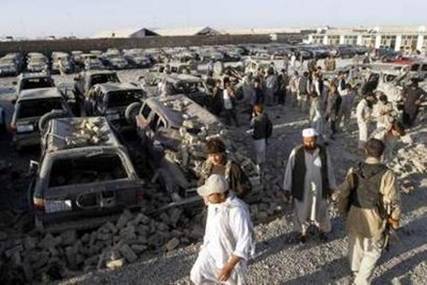
Destroyed vehicles at the Supreme logistics
compound in Kandahar April 28, 2010. The insurgent attack killed four people
and wounded at least 30.
REUTERS/Stringer
Apr 27 By NOOR KHAN and DEB RIECHMANN,
Associated Press Writers & Apr 28, 2010 DPA
Kandahar Police Chief Sher Mohammed Zazai
said militants detonated explosives near the city in an attack targeting a
compound providing logistical support to foreign forces.
At least four security personnel and two
bombers were killed late Tuesday in blasts and a two-hour battle that followed,
said Zalmai Ayubi, spokesman for the provincial governor.
Taliban bombers carried out the attack at the
security firm's compound outside the provincial capital, also called Kandahar,
said Sardar Mohammad Zazai, the provincial police chief.
The base is located 2 kilometres west of
Kandahar city's airfield, the main base for U.S. and other foreign troops in
the region.
More than 30 guards and
civilians working at the security firm's base were injured in the attack.
In a statement posted on its
website Wednesday, the Taliban took responsibility for the attack, saying three
of its bombers stormed the main compound of Supreme, a logistics and private
security company that transports supplies for foreign troops in southern
Afghanistan.
The statement claimed that 15
security personnel were killed and 60 injured while nearly 60 vehicles were
destroyed and eight oil tankers burned on the site.
“The First Time That Clash Has Been Reported
Between Militants And Police In Badakhshan Considered A Peaceful
Province”
27.04.2010 Xinhua
Police have arrested seven Taliban insurgents
in the relatively peaceful Badakhshan province in northeast Afghanistan, an
official said Tuesday.
"A unit of Police came in contact with
Taliban rebels in Wardoj district yesterday as a result of the gun battle seven
rebels were captured," spokesman for provincial administration Abdul
Marouf Rasikh told Xinhua.
In the clash lasted for several hours one
police officer was killed and two others including a militant and a police
constable sustained injuries.
Days ago Taliban militants gunned down a
police officer in Wardoj district.
This is the first time that clash has been
reported between militants and police in Badakhshan considered a peaceful
province in Afghanistan.
Meantime, Taliban purported spokesman
Zabihullah Mujahid in talks with media via telephone from unknown location
confirmed the clash and claimed that three-hour gun battle with security forces
left seven police dead, a claim rejected by Marouf as baseless.
U.S. OCCUPATION RECRUITING DRIVE IN HIGH GEAR;
RECRUITING FOR THE ARMED RESISTANCE THAT IS
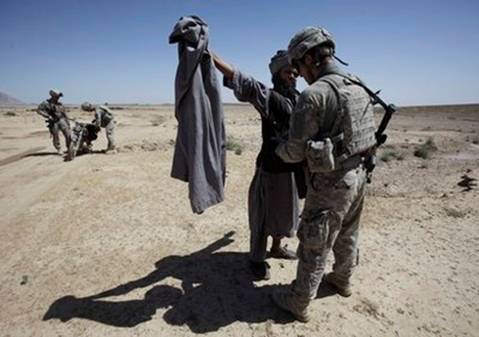
A foreign occupation soldier from the USA
puts his hands on the body of an Afghan citizen without consent during a patrol
April 27, 2010 in the Maiwand District of Kandahar Province. (AP Photo/Julie Jacobson)
Foreign occupation soldiers from the USA make
a daily practice of publicly humiliating Afghan citizens.
This encourages self-respecting honorable
Afghans to kill them.
[Fair is fair. Let’s bring 80,000 Afghan troops over
here to the USA.
[They can kill people at
checkpoints, bust into their houses with force and violence, bomb and butcher
their families, overthrow the government, put a new one in office they like
better and call it “sovereign,” and “detain” anybody
who doesn’t like it in a military prison endlessly without any charges
being filed against them, or any trial.
[Those Afghans are sure a bunch
of backward primitives.
[They actually resent this
help, have the absurd notion that it’s bad their country is occupied by a
foreign military dictatorship killing them wholesale, and consider it their
patriotic duty to fight and kill the soldiers sent to grab their country.
[What a bunch of silly
people.
[How fortunate they are to live
under a military dictatorship run by Barrack Obama. Why, how could anybody not love that? You’d want that in your home town,
right?]
ENOUGH OF THIS SHIT;
ALL HOME NOW
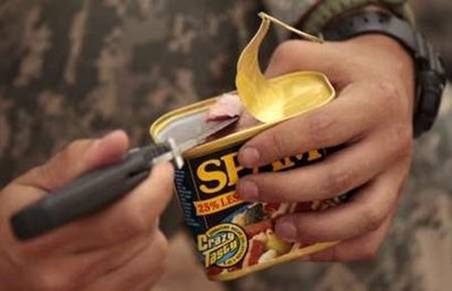
A soldier from the U.S. Army's 4-23 Infantry Battalion, 5th
Stryker Brigade Combat Team eats tinned meat during a break at an Afghan
National Police (ANP) compound in Helmand April 26, 2010. REUTERS/Tim Wimborne
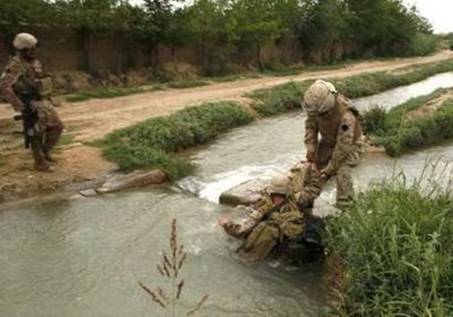
An interpreter helps a U. S Marine from 6 Marines, after he
fell into a canal during patrol in the Karez-e-Sayyidi area, in the outskirts
of Marjah district, Helmand province, April 26, 2010. REUTERS/Asmaa Waguih
SOMALIA
WAR REPORTS
Pirates Flee As Resistance Forces Advance:
“They Would Not Tolerate The Actions Of The
Pirates”
4.26.10 Mareeg Online & GAROWE ONLINE
Fighters from Somalia’s insurgent group
of Al-Shabaab has advanced to Harardhere, a central Somali coastal town
famously known as a notorious pirate haven, forcing pirates to flee with
hijacked ships and crews to another neighboring pirate stronghold.
According to reports that reached Garowe
Online, hundreds of Al-Shabaab fighters streamed from the central town of
Eldhere in the Galgadud region late Sunday, heading east towards Harardhere in
south central region of Mudug.
Tension and fear has mounted in the town
after the news of al Shabaab troop movement reached the people.
Somali pirates, who are holding at least six
vessels and more than 90 people hostage in the town, are said to have retreated
with some hijacked vessels and crew to Hobyo, another pirate stronghold about
108 kilometers to the north in Mudug region in central Somalia.
The al Shabaab fighters reached Villages 30
kilometers south of Harahrdhere and are reportedly heading to the town.
The spokesman of al Shabaab, Sheikh Ali
Mohamud Rage, said last month that they would not tolerate the actions of the
pirates.
“They used to tell us
that they are defending the Somali coast from illegal fishing and those dump
toxic waste in our waters, but now they have started to hijack commercial
Somali boats,” Sheikh Ali told reporters in Mogadishu last month.
The pirates hijack commercial and fishing
ships in the Somali coast and the Gulf of Aden and get large ransom of money.
The Islamist insurgent group
has been advancing in central Somalia in recent days, taking over control of
three towns, including Eldhere in the Galgadud region from the archrival,
pro-government Sufi group, Ahlu-Sunna Wal-Jama'a
Explosion Convulses New Foreign Troops Base In
Mogadishu;
Eight Occupation Soldier Killed
4/27/2010 (Sh. M. Network)
MOGADISHU
A bomber has been targeted to a new military
base for the African Union troops AMISOM [translation: foreign occupation
troops] at the former business bank in the Somali capital Mogadishu, witnesses,
officials told Shabelle radio on Tuesday.
Reports say that the explosion was carried
out by a bomber traveling a vehicle filled with explosive things and exploded
at the outside of the bank where the AMISOM troops made new base in Shangani
district in Mogadishu causing more casualties.
Witnesses said that the
| 




















